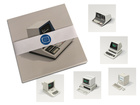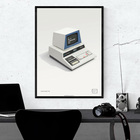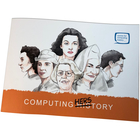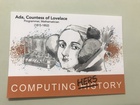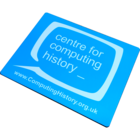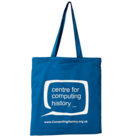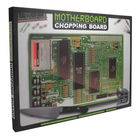
| Home > LEO Computers > LEOPEDIA > Oral & Narrative Histories > Ian Bruce: Interview, 5 July 2017 62999 |
Ian Bruce: Interview, 5 July 2017 62999
| Home > LEO Computers > LEOPEDIA > Oral & Narrative Histories > Ian Bruce: Interview, 5 July 2017 62999 |
Copyright
Ian Bruce and LEO Computers Society
Digital audio of a recorded interview with ian Bruce who worked on LEO III, having joined English Electric LEO Marconi in 1967. Interviewer: Mike Hally Transcript editor: not documented, with notes by Tony Morgan Abstract: Left school in Edinburgh aged 15 to be apprenticed to his father’s Radio and TV supply and repair shop. After 4 years, expecting to take over the business, his father sold the business leaving Ian to find a job. On seeing an advert by EELM for computer engineers applied, sat the aptitude test and was offered job of trainee Data Prep engineer, assigned to work at CAV LEO III site in Acton. Subsequently took on computer maintenance with special skills in maintenance of magnetic tape. Worked on a number of sites including Post Office LEO 326 in Edinburgh and later on a range of ICL computers. Became team leader but retired when offered early retirement Fujitsu after 35 years service. Keen on sports and still active as a swimmer. Date : 5th July 2017Physical Description : 1 digital file, audio Transcript : LEO COMPUTERS SOCIETY - Oral History Project Interview with Ian Bruce by Mike Hally with notes by Tony Morgan [Mike Hally]: So, it's the 5th of July 2017 and I am MH. I am interviewing Ian Bruce to give us the story of his involvement with LEO Computers from the earliest days. So, good morning Ian, we are recording this interview as part of the LEO Computer Society Oral History Project. The audio version and the transcript will be lodged at a central archive and made available for researchers and members of the public. So to start with can you introduce yourself. [Ian Bruce]: Good morning, this is Ian Bruce. I was fortunate enough to join English Electric at nineteen years old. [MH]: Can I just take you back then? I’ll just briefly ask you about your family, before you joined English Electric. So where were you born. [IB]: Right. I was born in Edinburgh. I attended Groathill Primary School and Tynecastle Secondary School, which is famous for being next to the Heart of Midlothian Football Club. My father had a radio and television shop, so it was natural for me from about twelve years old to be in the shop, mucking about with electrical things, toasters, irons, the occasional radios. When I left school I went to work for my father for a year as an aerial rigger, and then onto his mates business and started my apprenticeship as a radio and TV engineer. [MH]: What about your mother, what did she do? [IB]: My mum had four daughters and four sons, so she spent most of her life bringing us all up. She was pretty well housebound but succeeded to bringing all up to become decent. I image now she worked a lot harder than our Father. [MH]: And when were you born? [IB]: I was born in 1947, the 11th of November 1947, which, if you remember is Remembrance Day, so it's always easy to remember, it flows off the tongue quite easily, eleven, eleven, forty seven. A home delivery at my Granny’s. [MH]: And all these brothers and sisters? Are they older, younger? [IB]: No. My sister was the oldest, I was the second. I had a brother who was the third and another sister who was the fourth, and then I had brothers and sisters under that. It was made up of like 3 families, the older 3, the middle 3 and 2 youngest. Most people used to say my father deserved a knighthood for having all these bairns ( kids ). He always replied he tried that but it never worked. Oddly enough when I was on my LEO 326 course, I got a phone call from Aberdeen where my mum and dad were staying at that time, informing me that I was the proud brother of a wee sister (Wendy ) I was about twenty-two. She is now fifty married with two sons. [MH]: Any particular early memories from your primary school years? the fifties were a fairly tough time, weren't they? Fairly austere? [IB]: My only memories was I was quite ill ( Saint Vitus dance). Because we come from such a large family it was advised for me to get away from that environment for a while. So I was brought up at my granny’s also in Edinburgh for about 18 months then returned to my mum and dad in a housing estate called Drylaw in Edinburgh. Two of my real big memories of Drylaw we’re constantly looking out the bedroom window and seeing all my school mates coming and going to school, which was hard to understand why I was not joining them. (Oh poor wee soul your thinking). But when I did go back to school I did take up sports in a big way, maybe due to being stuck at home and my grannies for a long while. I did reasonable well in class, but participating in sports was particularly good for me. I did become the captain of the school football team and was always in the top 2 for any other sporting events. I learned to swim at Glenogle Baths in Edinburgh. I represented Glenogles and trained very, very hard for the YMCA, the Young Swimmers Athletic Association. My swimming career peaked when I won the Dormie medal for the freestyle and a prize for the breaststroke. It was staged at Glasgow Govan Baths. The medal was my fathers pride and joy. The medal itself was held in The Swimming Club for about a year and then I got it ( or should I say my Dad got it). That was a great memory at school, The next morning at school all my class mates and teachers congratulated me. They say everyone has 5 mins of fame, well mines was a whole day. During that day the headmaster and many teachers come into my class to personally congratulate me. I never really stopped swimming. At present I'm a member of a swimming club in Edinburgh. Nuffield is a big nationwide sports club. I am still a member at 71 years of age. [MH]: And what about on the academic side? [IB]: I'd done the Edinburgh Leaving Certificate and I left school at fifteen. The reason I didn't stay longer to sit my higher etc, was my dad had a radio and tv shop and my future would lie there. As expected I was taken into the business. After about 1 year I was farmed out to his mate who owned Craigleith Radio and TV on Queensferry road in Edinburgh and I started my apprenticeship . When I got to the end of my fourth year, my dad sold the business which put paid to my plans of taking over. I decided then to move on. I was very aware of the introduction of computer engineering, and after seeing an advert in the local newspapers that English Electric Leo Marconi were looking for engineers in London I applied. Working on the theory that in a years time I was probably going to leave the tv trade and maybe get into computers?. This was a position that would get me into computers a wee bit earlier than was planned. I got interviewed by Sean MacDonald who was based at Park Royal, London. He took me and another apprentice on and that's how I started with English Electric. [MH]: And what age would that be, roughly? [IB]: Twenty. [MH]: So, you got taken on then, so what were the next steps? Did you go straight into computing? [IB]: No. the majority of Computer engineers were ex RAF engineers. I was taken on as a DP Engineer. Hoping eventually to become a computer engineer. I started in London. I was about a year there. I stayed in Hammersmith, Ravenscourt Road, and It was decided that I would work and train at CAV’s in Acton. As I remember what was unusual about CAV’s in Acton is the computer room had big double windows looking onto the main Acton High street which allowed the public to look into the computer room. In these early days the mag tapes, paper tape whirling round, and the printer pushing boxes of paper out at a fast rate must have been like tomorrow’s world. It was for me. But I was a DP engineer, and I started on old mostly mechanical ‘Creed’ paper tape punch and verifiers. Most of the input to computers then was done on paper tape and cards. So I worked there for a while servicing Creed equipment. Mechanical engineering was not my forty but I bashed on . Due to my knowledge of electrics, The Leo engineer in charge ( Jim ) allowed me to do minor maintenances tasks. Elliot tape readers come to mind, which consisted of mainly hoovering and cleaning them . This gave me the urge to be a computer engineer one day. Being watched by the public in the computer room was at first quite uncomfortable, but being seen working on computers was great. I appreciate Creed equipment gave me my start into the computer industry and the Leo in particular. I feel very lucky to have been given this opportunity. I was a TV engineer and was more used to using scopes and meters etc but my future was going to be in computers. With a little luck I would become a computer engineer, little knowing that my dream would come true sooner than later. [MH]: Before we come back to those old machines. Creed, was that an abbreviation for something? [IB]: No, it was the manufacturers name. [MH]: Uh-huh. [IB the punch room was quite big. Half of the room would be punch tape operators, all females, the other half was the paper tape verification girls. So one side produced the unverified punched paper tape and the verification was done by more accurate and experienced operators. This was to try and make sure the verified output which was loaded into the computer for processing to be as accurate as possible. This process I think was the main input to the computer to be processed and had to as accurate as possible. You would have to be there to see how quickly the girls could type. You can imagine the banter we had with a room full of females, most of it came from the females and pointed at us trying to embarrass us at all times. I can now confess they are did!. [MH]: And the other thing you mentioned was fascinating, the computer being right on the street of course. Was that a deliberate publicity thing? [IB]: I think it must have been. That computer was a LEO III, and I think it had transistors but had some valves ( I Think) I was familiar with the Millard valve tester and can remember testing valves for the Engineer in charge, I think. Better than working on paper tape punch and verifiers. The engineer in charge (EIC,Jim ) was the guy who done Monday to Friday day shift with three engineers working a three shift system, days, evening and nights. (Technical Note. LEO III was a transistor parallel machine. LEO II was serial valve machine) [MH]: This is really interesting then. So that was a LEO III. [IB]: Yes I think it was. [MH]: So that was your first contact with a LEO, even if you weren't working on it directly? [Ian] Yes. [MH]: And on the main street LEO was a big publicity thing it appears? [IB]: It would be. It could be quite embarrassing for operators and engineers sometimes, when processing data for operators or for engineers servicing repairing and performance maintenance on various peripherals in the computer room with people standing there looking on in amazement. The other thing was CAV had a unusual staff lift. Instead of having one going up and down, they had a lift that went up, along, down, in a circular motion. And, of course, the big joke when they caught you on your first visit to the lift for fellow lift users would say “right, we’re coming to the top now, hold on 'cos it's gonna to go over”. Good fun now but at the time the quite scary. That was quite an interesting thing about. (Historical note. The lifts were called paternoster lifts. The computer cabinets were built into false walls with the gaps filled with extra cabinet doors. The engineers used to play a game with the people watching from the pavement by disappearing through one door and appearing through another one in another wall. I commissioned and installed III/5 and it’s the only time I’ve pressed the Emergency Stop in anger. Water was flowing into the store cabinets causing a Store Parity Failure. The CAV Fire Brigade attended in their Land Rover) [MH]: Now we’re talking the late sixties now I think aren't we? About 1967 [IB]: Oh, yeah, I would say... [MH]: you were twenty? [IB]: I would say sixty, aye, sixty-seven. [MH]: So to get back to the story, you were saying that you got moved on to these old machines, the mechanical ones? [IB]: Yes. The old paper tape punch and verifiers, the manufacturer was Creed. I was then trained on the new range of punch and verifiers that was to take over from the old Creed machines. I attended a Course in Copthall house in Newcastle under Lyme on the Australian manufactured Friden punch and verifiers. Friden equipment was right up to date mostly electronic with only a few mechanical parts I.e. key board and paper punch assembly. One Friday when working in London I was asked, if I could take a Friden power supply up to Edinburgh. As I was going home that weekend I agreed to take the power supply. I was at my mum and dad’s when a English Electric engineer George Peggie,who was the engineer in charge of the LEO at the Royal Bank of Scotland computer site ) came up to the house to collect the PSU. When I was just chatting to him like you do he informed me Ed Pederson ( the original Leo computer in the ROYAL BANK of SCOTLAND) who was the Scottish Engineering manager was looking for Engineers and was I interested in coming back to Edinburgh. Yes I replied. Ed Pederson phoned me up and said, ‘look I'm disappointed that we need engineers here and you're in London’. I said, ‘but I'm not an computer engineer, I'm a data prep engineer’. He said the PSU was for Edinburgh Corporation Council, and he was looking for DP engineer for the new Friden machines that had recently been installed in the Council punch room, which luckily I had just been trained on. He contacted London explained the situation to Sean McDonald and I was allowed to return to Edinburgh.( Hurray ). London was great but coming home fab. Loosing the London allowance not so good. The allowance was about £3 per week and paid by most big companies to help staff to meet the extra costs of staying in London. I was offered the position of DP engineer in Edinburgh Corporation council offices, as the onsite Friden Engineer, sharing the same engineers room along side the English Electric computer engineers maintaining and servicing the System 4 mainframe. (Technical Note. System 4 was a copy of the RCA Spectra 70/45. We did buy some as interim machines awaiting System 4 to come on stream from Winsford. I went to West Palm Beach in Florida to get the tape decks for the first one) [MH]: Yeah. Yeah. And just going back a bit as well when you first went to CAV in Acton? Did you know about LEO at the time? [IB]: No, It was only after I worked at the CAV computer centre in Acton that I became familiar With the Leo brand and its History, ie Leo, Leo Marconi, English Electric, ICL eventually to become Fujitsu. Much later when with ICL I began to look up the Leo computers history. I released how fortunate I was to be involved with this wonderful range of computers. Reference the valve tester I was almost sure CAV had a valve tester??.Maybe it was at Post Office computer centre helping the ICT DP engineers in Edinburgh or the older Leo at the Royal Bank of Scotland. (Technical Note. Ian must have worked on a LEO II for a while. The description on the Mullard valve tester was standard LEO II practice. It was called ‘egg boxing’ because of the wooden box which you put tested valves in to put in a unit in the machine during a maintenance period and take the old ones away to the valve tester [MH]: Right. [IB]:The Corporation had a System Four, a real up to date modern computer, but I didn't do much on that, I just done the Friden , occasionally helping the on-site engineers repairing Magnetic tape units. More watching than assisting. Whilst working on Friden for about a year a situation developed at a Leo 326 contract in Edinburgh. What happened was basically the EIC and the 3 shift engineers handed in their notice. So Ed Pederson took me aside and said, ‘do you think you could work on this computer. I said well I would like to but I warn you it was a massive step up for me. We agreed for me to take the current test paper for a any interviewed computer engineer. So Ed took me through the test sheet and with a little help I passed. And that's when I started my first official computer course with the now famous LEO computer, in this case the LEO326 at the Post office computer centre, Edinburgh (NDPS, I think) [MH]: Would that be a written test or a practical, a bit of both?. [IBit] it was a A4 sheet with electrical, and some logic question, and a soldering test. No problems with the soldering as you would expect. He just gave me the written test, I remember unusual things like trying to see if you understood what and how a big magnet could be used in industry like on ship or in in a scrap yard. AC and DC, PSU. But logic wise, there was, the famous logic test T W O over T W O’, adds up to ‘F O U R’, substitute the letters for numbers. The usual Logic AND,OR gates were part of the questions which I scrapped through, luckily I had read up on Logic for a few days before the test. [MH]: Right. [IB]: After passing the examination given by Ed Pedersen and I got put forward to attend the LEO 326 course which was to be run at the GPO Computer Center in Edinburgh. The very site that the English Engineers engineers had all handed in their notice. The computer was used by the POST OFFICE for telephone billing for Scotland, Northern Ireland and Hull. The course was given by an engineer Guy Oxley who worked for English Electric as a EIC in Glasgow on a large Leo 326 Site for DNS I think. A great character and a great Leo instructor and engineer . He gave the course, it was about ten weeks longs. You covered everything except the peripherals. You learned the workings of the Leo326 and how it communicates to the peripherals and memory etc. After the course we had a few weeks with the current engineers mostly on the peripherals. Maintenance and repair on the decks, printers, card readers was given priority. Then the take over from old team to new team. Quite a massive change for me. [MH]: And it sounds like all your technical training was on the job really. [IB]: Yes apart from the official course which most of the time was well above my logical ability at that time. My first shift on my own was a Sunday night. You had to switch on the computer completely and run the verification suite, which tested all loaded up peripherals. Loaded up magnetic tapes on each mag channel, paper on the printer, punch tape in computer mode, and the paper tape reader ready to accept the output from the PT Punch, and load paper onto the Anelex printe. The master verification tape was always set on Channel 16 address 0 on the first Magnetic Tape Channel. If everything went ok the Operators started processing at 2300 hrs. Although terrified I got through the night. [MH]: You didn't go off to day release either. [IB]: No. [IB]: Nothing like that. All on site experience only. George Peggie eventually became the engineer in charge. George was RAF trained with previous Leo experience helped me tremendously on all the peripherals and to become a life long friend. Experience was gained the longer you were there. Fixing peripherals was the most common activity, with mag tapes and printers the most worked on devices. Main frame faults apart from power supplies normally involved calling out the EIC (George Peggie) who was on call at all times. New starters were Charlie Disbury from the north of Scotland. He previously worked in the nuclear power station in the north of Scotland. Charlie took to it well actually, earlier than me for sure. There was myself, who was just starting on computer peripherals and as I said it was my first computer job. And I can't remember who the third person was but it would have to be three. The then Post Office computer centre was divided into two if you like, there was a computer section on the left-hand side a single floor which consisted of the management suite and the main Leo326 computer room which accommodated the offline operators area, the engineers room , the EL&P room ( Post Office electricians) and the shift workers canteen. The right hand side was a basement with 4 levels above. The top level was the canteen and sitting areas for staff and the games room. Three levels I think were all to do with input to the Leo in the form of 80 column cards and paper tape. The 40 column cards were created at the relevant telephone exchanges and sent to the Leo to allow the processing of the bills for that area.The engineers who serviced the DP side were employed by ICT later to join with us to become ICL and then onto Fujitsu. Some of these guys eventually came over and joined us to help out with all peripheral maintenance. Two eventually come on permanently as shift engineers. Andy Muller and Tommy Sargent. Alan Farish joined us as a last year English Electric apprentice from England. He stayed on in Scotland and made 50 years service when he retired . Last but not least David Hunter one of the best computer engineers ( Leo and 2900 ) I was proud to have worked with. Most shift time was working on Potter tape decks, MT120’s I think, Analex printers, ICT and Uptime card readers 40 and 80 column card readers. They were the peripherals that went wrong most of the time due to constant use. Then there’s a the operators console and typewriter. It was a IBM typewriter and was the main output only device. The input instructions were done on a 12 bit indicator register divided into 3x4 keys. I cannot remember all the combinations used( 4,0,2 comes to mind). Later computers started using the more familiar vdu and keyboard. Our ex ICT guys came into their own fixing the IBM Typewriter, and excelled when refurbishing the Anelex Printers. [MH]: So you were very much on the electronic side? [IB]: Yes I did my share but preferred the maintenance and repair of Magnetic Tape Decks. . As time went on learned to fix some mainframe faults with the help of George Peggie (EIC) and Bill Dunscome the local Leo support engineer. Over time I became quite good at peripheral repairs, mag tape, printers card readers. I ended up specialising in Potter mag tapes decks possibly as we had 15 units, and they were the most worked on equipment. I got to the stage when I think I got good at Decks. I enjoyed fixing the more difficult faults. I enjoyed repairing all peripherals but mag tapes were my favourite device. But hey Leo computers can never be written about without mentioning the Operators. Three shifts were covered, Sunday 2300 hrs till Friday 2300 hrs. Each shift consisted of one HEO, EO’s, SDPO’s and DPO’s. Engineers repaired, but, by god the operators could get this beast running like a well oiled watch. Great set of guys and gals. I learned a lot from Ops that enabled me to better service peripherals. Three tea breaks per shift consisted of eating, table tennis, darts and cards. Most of the ops were great at sports and many great social events were enjoyed. Some of incidents as you can imagine cannot be discussed. One really funny incident occurred that was annoying the operators. The Leo 326 kept going into a micro program halt condition due to some static problems we were having at the time. This was annoying the ops as they had to leave the main consol, go to the engineers panel, set to Engineers and proceed to restart the the processor by pressing the micro start button, press switch back to Ops, return to the ops consol and continue processing. This could happen numerous times during a shift and was annoying to all. You can imagine my surprise when starting one shift I asked why there was a piece of string going up from the ops consol, across the ceiling and going down to the engineers panel held together with paper clips, cello tape and blue tack. They demonstrated that by pulling the string at the ops end the other end of the string operated the micro start switch. Genius. My shift had some super operators and really nice guys, a delight to work with. Some names were , HEO Bill Patterson, Mrs Bruce, EO Graham McNab, Kenny Cadogan,Robin Munroe, SDP’s ( the main drivers for the Leo ) Alan Turpie, Dave Shade, Dougie Anderson, Tom McFarlane, Eddie and Janet Porteous (Brother and sister), Torrance and June Gemmell, Frank and Maurice Dougan, the Winter twins, Jim Smith, Irene Boyle, Davy Campbell, Winnie Gallagher not forgetting Daisy the stripper!. The overall computer centre manager was Jack Forbes, a remarkable man. I still bump into some of the ops and it’s always great to catch up and discuss old times and also some of the incidents that cannot be printed, a great crowd. Apologies to any one I have missed. Leo Computer operators were a very important part of the Leo story and I hope to read some input from Ops in any Leo history articles in the future. The operators still have Leo nights occasionally and I believe have many mementos taken off the Leo on the final closing day. [MH]: So how many years would you be doing that, working on LEO? [IB]: I worked on for approximately ten years. The LEO was to be replaced with a ICL 2900 series mainframe. Just before I was moved over to 1900 I spent some time working with a retired engineer, Tom Davidson who eventually helped to put the LEO 326 to bed . The brother of Charlie Disbury, Robert was the last site engineer to finally put the Leo to bed. Regarding Tom Davidson, taking over the servicing of such a massive computer in his final working years before retiring was commendable. This allowed ICL to train all shift Engineers on the 2900 Series, in my case 1904s and eventually 2966 series. [MH]: 1900 and the 2900 what manufacturer? [IB]: The 1900 range was ICT and then a ICL Range. The 2900 was the ICL Range. Both companies later become Fujitsu. [IB] (Technical Note. System 4 was a copy of the RCA Spectra 70/45. We did buy some as interim machines awaiting System 4 to come on stream from Winsford. I went to West Palm Beach in Florida to get the tape decks for the first one) [MH]: Yeah. Yeah. And just going back a bit as well when you first went to CAV in Acton? Did you know about LEO at the time? [IB]: No It was only after I worked at the CAV computer centre in Acton that I became familiar with the Leo brand and it’s History ie Leo Marconi then to English Electric Leo to ICL to Fujitsu. Much later when with ICL I began to look up the Leo computers history. I released how fortunate I was to be involved with this wonderful range of computers. I am almost sure CAV had a valve tester, maybe not. I could have used the tester at the Post Office with the older DP equipment I am not sure. However testing valves was more interesting for me than Creed punch verifiers or Friden punch verifiers. At 71 now it is amazing to realise I worked on valves and transitors. As a radio and tv engineer my 2nd year was valve theory ?? (Technical Note. Ian must have worked on a LEO II for a while. The description on the Mullard valve tester was standard LEO II practice. It was called ‘egg boxing’ because of the wooden box which you put tested valves in to put in a unit in the machine during a maintenance period and take the old ones away to the valve tester) [MH]: So what about after you finished at LEO then? What was the rest of your career? [IB]: After LEO I went onto the ICT 1904S mainframe computer ( now ICL ) at DHSS in Livingston 16 miles west of Edinburgh. I worked shifts there for about 7 years A contract very like the Post Office in Edinburgh, great building to work in, fantastic operators and the 1904s although a lot smaller but much more powerful than the Leo 326, it was a superb computer. I left mainframes and worked in the Office system team on The DRS range. A job I loved and got my first company car to boot. Eventually became a team leader ( boo ) and continued on to various accounts. My first TL post was in Edinburgh on the Marks and Spencer’s account and then onto the Post Office counters contract. I was not as keen on management, more preferred being in a team, than running a team. Being in charge of people was much more difficult than repairing computers and peripherals. Little or no training was available for this position, and experience over time appeared the way forward. The majority of stall were fine and easy to deal with, but some were loose cannons to say the least. Being a person who would rather pat someone on the head than kick them up the behind certainly did not suit my management style. Possible the major problem was I was based in Edinburgh but controlled from England. ( no disrespect to the English nation ) I would have preferred to have been part of the Scottish team with support from more experienced colleagues when required. I eventually asked for and was accepted for redundancy at 55 years old with 35 years service. I am sure I would have stayed longer if I had remained part of the Scottish team, as I was for all my engineering career. [MH]: Yeah. And all this time you're still working for ICL are you? [IB]: Yes. [IB]: I stayed with ICL till I accepted redundancy in 2002. [MH]: So these other sites like DHSS you were there as a ICL engineer? [IB]: Yeah. We were only on site subcontracted engineers. The company’s bought our computer and we were a preferred service offered to all customers. [MH]: Yeah. So in your retirement then what keeps you busy, what's your interests? [IB]: Well my interests are many. I've got my wife, then my house, garden and my garage workshop. The garage is like an engineer’s workshop. I am ‘Mr Fix-It’ DIY guy for everybody. No matter who it is in my family, my street. If anybody wants something fixed, wants something tuned in, wants something done, I do it mainly household DIY tasks. My love for swimming has always been there. Supporting the Hearts and playing bowls. I have enjoyed working for Care & Repair as a DIY volunteer or just over 2years. Strangely enough their head quarters are in the old ICL Office in Osbourne Terrace in Edinburgh. [MH]: Yeah. You mentioned the swimming, yeah. [IB]: I have always enjoyed swimming. [MH]: Yeah. [IB]: After I decided to stop working at 62 I I joined a Nuffield swimming club. I've been a member of the club since and I swim five to six days a week. It was initially the gym and then onto swimming. Eventually I began to have knee problems, so I concentrated on swimming only. What I found difficult in the gym was less painful in the water. [MH]: And you obviously got interested in LEO history again and the LEO Society. Was that in, just in recent years? [IB]: Well I got more interested when I retired. I went onto YouTube and I started look up Leo computers. It was nice to recognise all the different machines, peripherals, people and places. I didn't go into it too much but it was nice to see the places that I worked. A place named Hartree House in London was an example. I used to do some holiday relief there. My knowledge of Potter Decks was well received. [MH]: Yeah. Hartree House, is that the one that was in the Whiteleys department store? [IB]: No sure. I think it was Bayswater. [MH]: Yeah. [IB]: The computer manager for the Post Office, Jack Forbes would occasionally fly down and attend meetings at Hartree House. When I was covering holidays at Hartree House, I sometimes flew down on the same plane as Jack. A Post Office driver would meet Jack at the airport and to take him and me to his meeting as Hartree House and drop me off at Acton. ( very posh) [MH]: Yeah. Yeah. Good, well I think we've pretty well covered it all, haven’t we. [MH]: So, yeah. Oh the, just the only other thing was professional societies, did you ever, were you ever a chartered engineer, or... [IB]: No, exactly as I said to you, I worked in the t.v. trade since I was about twelve, thirteen due to my father having a radio and tv business. At fifteen I went to work with my dad for a year and my dad moved me over to his mate to start my apprenticeship. I went from my apprenticeship into English Electric and gained all my computer qualifications from English electric, ICL and finally Fujitsu. [MH]: Yeah. [MH]: Your wife wasn't in the same kind of business at all? [IB]: No, my wife actually worked for the Bank of Scotland She was there for twenty three years in total ending up a assistant manager before she retired . [MH]: Right. And your son, or other children, they.. [IB]: Craig served his apprenticeship as an electrician. Then moved into sales. He has been very successful at sales, which suited his personality more the being an electrician. Lastly since the interview me and other engineers have set up a ICL Reunion lunch. It is every even month on the first Wednesday of the month. The location is at PLATFORM FIVE Restaurant at Haymarket, opposite the Waverley train station. Easy access for trains, buses and the Edinburgh Tram service from the city centre or the airport. Any engineers visiting Edinburgh are welcome. Leo engineers attend with a great mix of retired ICL and Fujitsu engineers. Some characters like Bill Craig, John Litster and John McNeil are regular attenders, they could be familiar with any engineers who worked in Scotland. [MH]: Okay. Right, well again there's a little piece I have to read at the end of the interview [IB]: Right. [MH]: If you think of anything else after I've done this we can just add it on. So, this interview with IB has been recorded by the LEO Computer Society and the Society would like to thank you very much for your time and reminiscences. The interview and the transcript form part of an Oral History Project to document the early use of electronic computers in business and other applications, but particularly in business. Any opinions expressed are those of the interviewee, that is IB, and not of the Society. The copyright of this interview in recorded form and in transcript remains the property of the LEO Computer Society 2017. GOOD BYE LEO, it was wonderful to know you and all the lovely people that surrounded you. [IB]: That's it. [MH]: Great. [IB] Hope you like it. [MH]: It will be fine. Provenance : Archive References : CMLEO/LS/AV/BRUCE-20170705 , DCMLEO20220804006 This exhibit has a reference ID of CH62999. Please quote this reference ID in any communication with the Centre for Computing History. Copyright
|
Click on the Images For Detail
|

